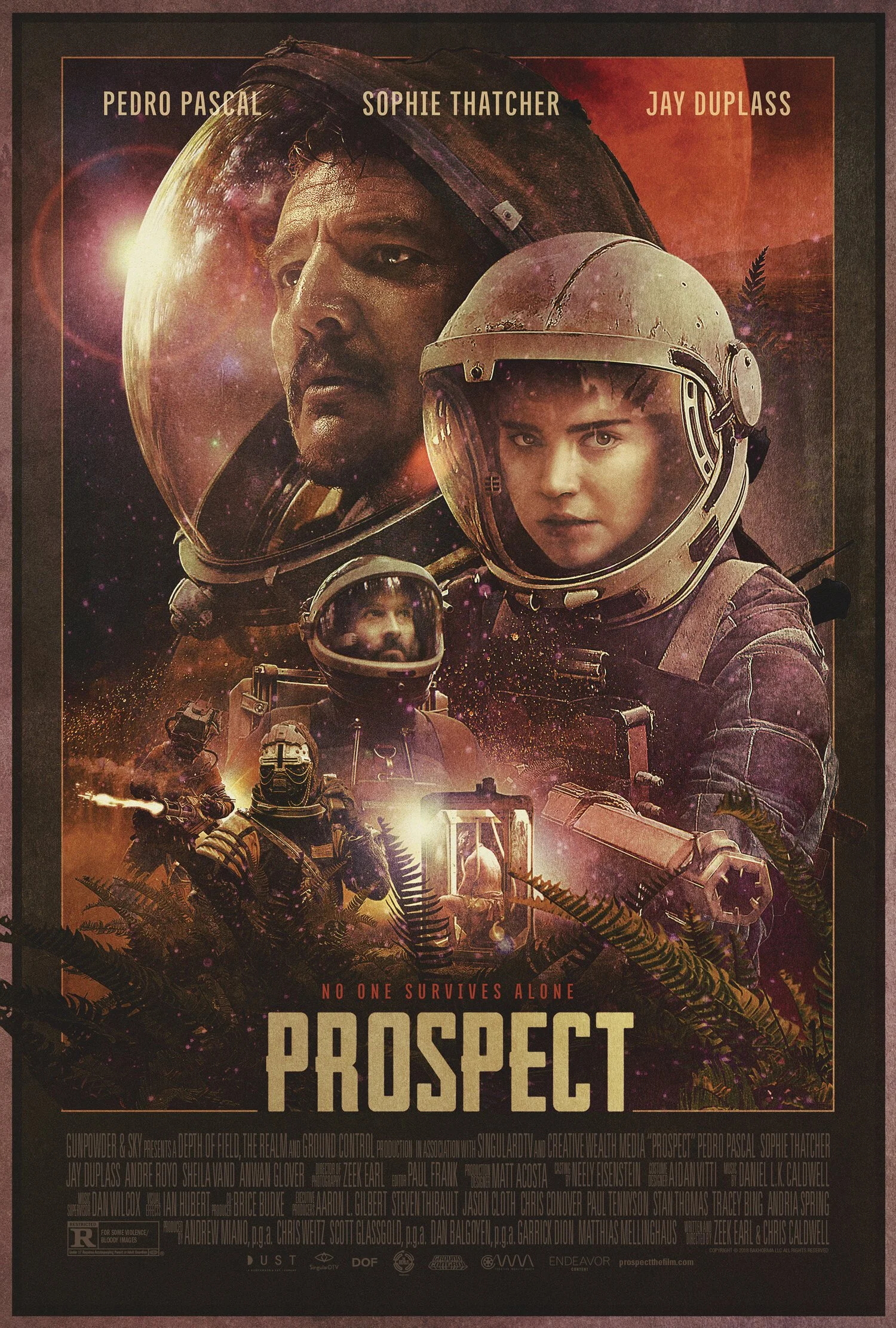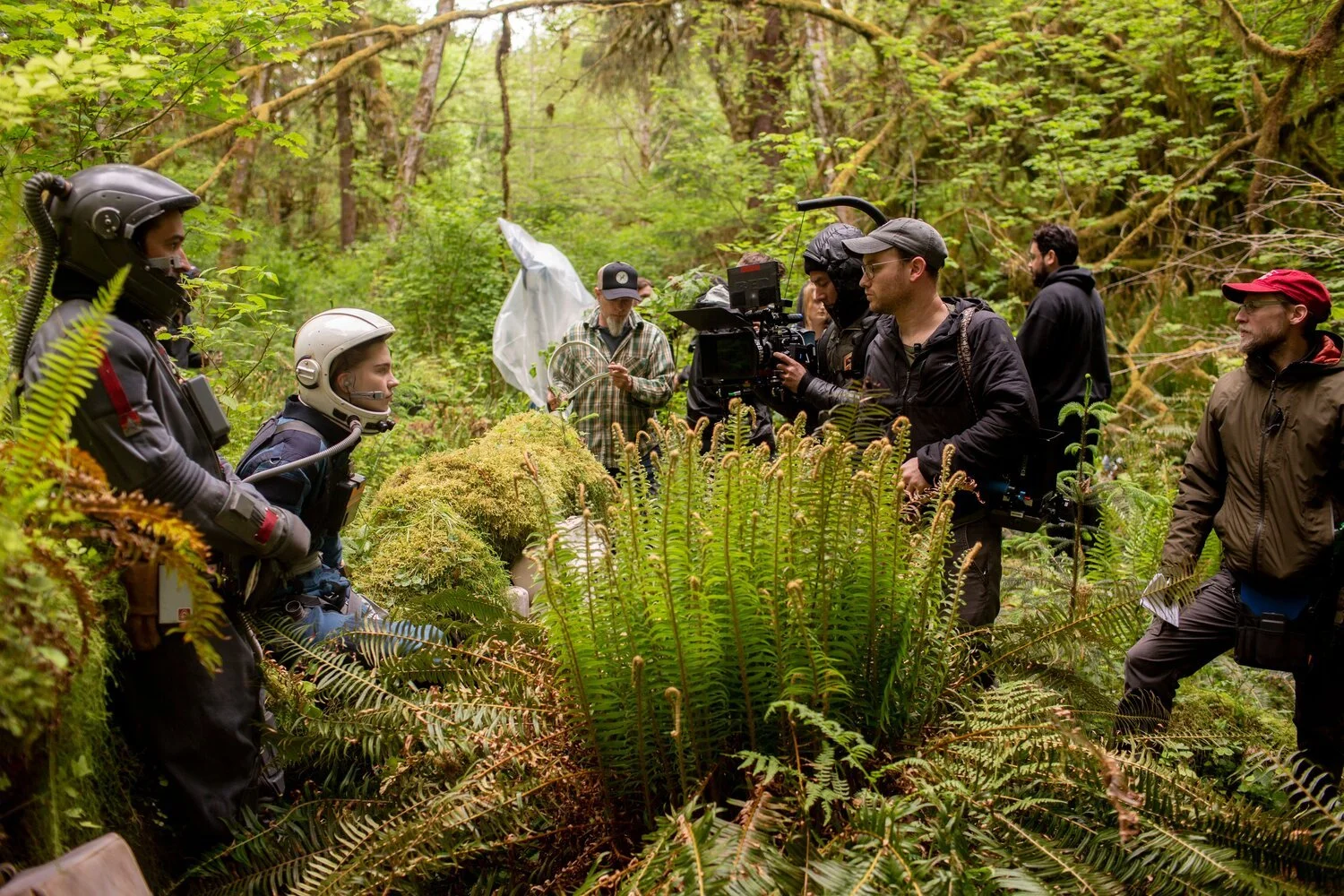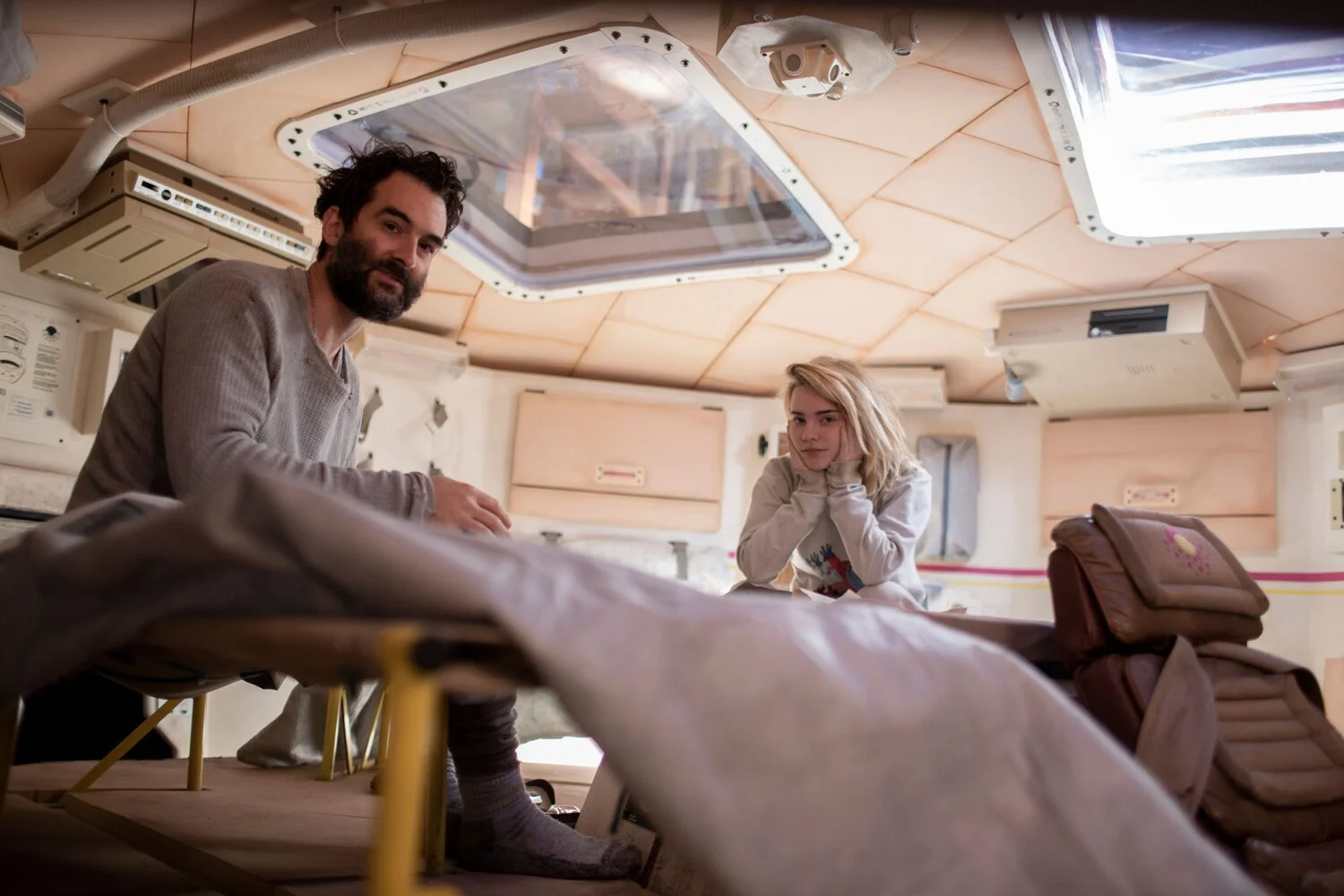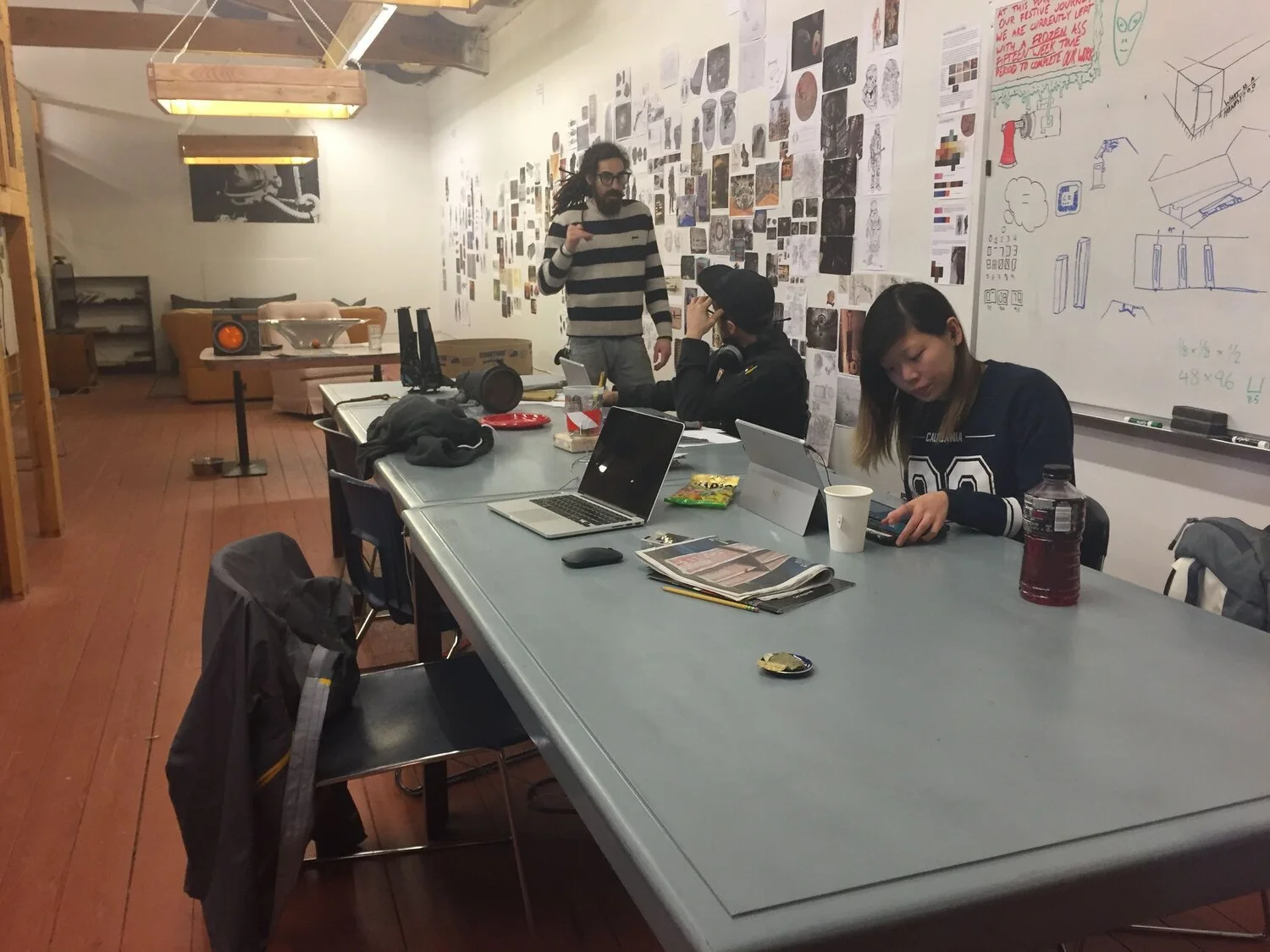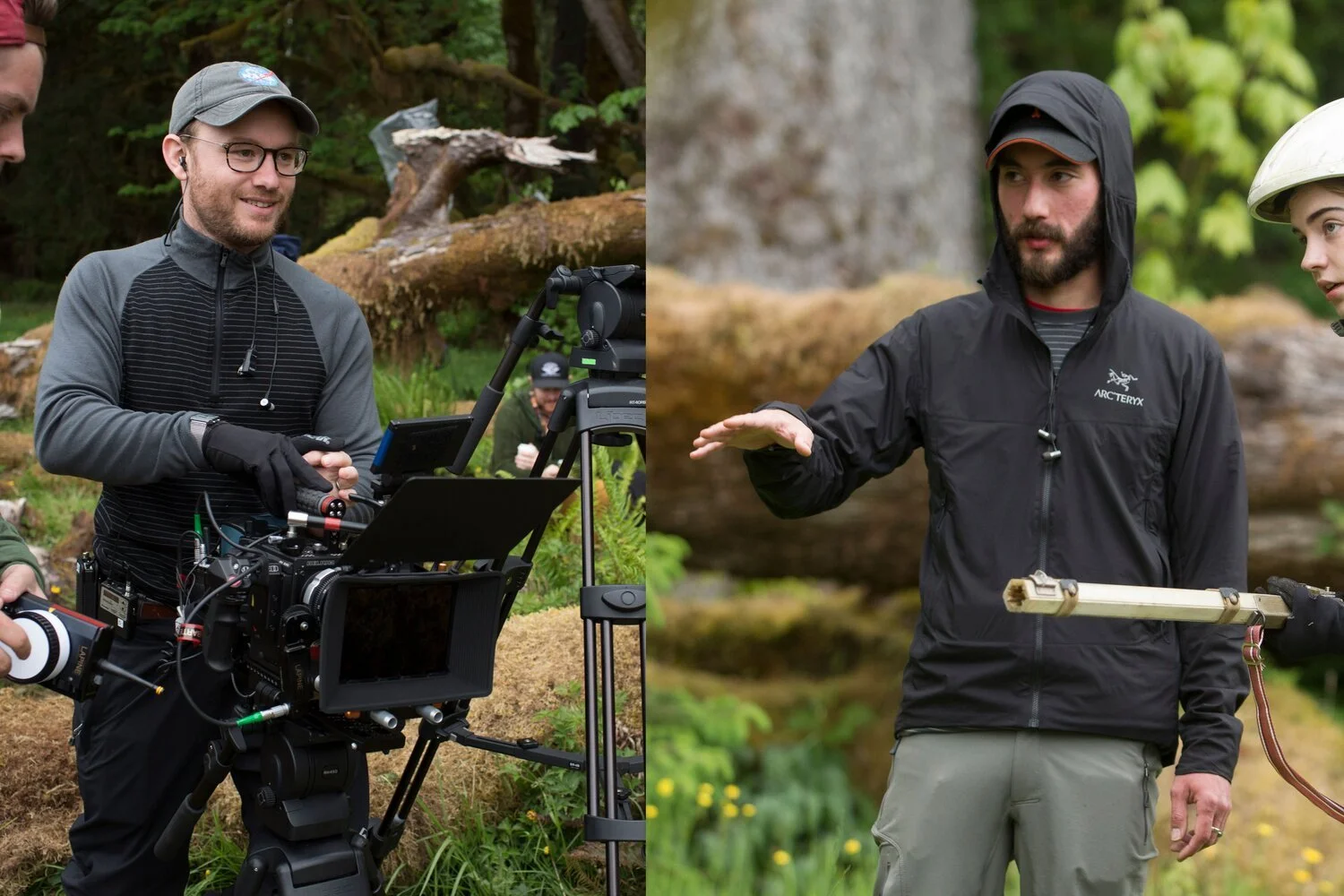Zeek Earl on World Building, Westerns, and the Perils of Low-Budget Filmmaking
This interview was originally written for Sainte Magazine.
Two minutes before our scheduled interview was to begin, filmmaker Zeek Earl sent me sweetest, simplest email that’s ever been composed: “Call me at 10:02, I’m brewing tea :)”
When I called at 10:03, the tea wasn’t ready yet. Earl explained that, like so many others, he and his wife, psychologist Rachel Earl, have been working from home since quarantine began back in March. “She’s on Zoom like all day,” he tells me. “The hot water is near her work station. I’m pouring it now, then I’m going to run away from my wife.”
Just before quarantine began, Sainte published a series called “Movies to Watch for Any Valentine’s Mood”, which included the 2018 space western, Prospect, co-written/directed by Earl and his filmmaking partner, Christopher Caldwell, both born and raised in the Pacific Northwest. As life under Covid-19 descended upon us all, and days in quarantine stretched into weeks, now into months, I found myself seeking out comfort more purposefully than before: an espresso in the morning made with my favorite local coffee (Populace), long aimless drives to find old, forgotten cemeteries, writing and reading poetry, and re-watching Prospect as many times as possible.
Now available for streaming on Netflix, it is there that I find the most captivating synopsis of this unique film: Greed brought them to this dying world, but they’re not the only ones looking to cash in. This story is intricate, from the first shots of an alien language written in a young girl’s journal, to the smallest details within a drop pod that just crash landed on a forested moon, to that moon itself, beautiful but rife with danger -- there is not a single boring or uninteresting shot in the entire one hour thirty-nine minute runtime. And this careful, immaculate world-building is made even better by the actors in its lead roles: Sophie Thatcher, Pedro Pascal, and Jay Duplass.
I spoke with Zeek Earl about how Prospect came to be, the perils of low-budget filmmaking, and what lies ahead for this incredible universe.
Photo courtesy of Zeek Earl, Shep Films
[Cassandra Litten] How did you [and Chris Caldwell] start working together?
[Zeek Earl] We met in college. We both went to a kind of small liberal arts college in Seattle called Seattle Pacific University and studied English creative writing together and found out we had a lot of similar interests. I always aspired to be a filmmaker, but wanted to study literature or philosophy and art first. … Chris didn't, but we both graduated into the recession and failed at getting jobs at ad agencies. We decided just to start doing our own thing. At the time, online commercial competitions were a new thing, like crowdsourcing, and we just decided to start doing these commercial competitions together and were able to start a business, start a production company. The aim was to always make our own stuff on the side. So, we had this commercial business that allowed us to get camera gear... it's kind of film school in a way. We started doing short films on the side that eventually turned into features.
[c.l.] And Prospect started as a short film, right?
[z.e.] Yeah. We did Prospect in... [2017], it was like a three year process between the feature film getting greenlit and the short film being made. But that was our intention for it from the get go. We had already been to South by Southwest once with our previous short film In the Pines. We learned so much from that experience, so we went back to it with much more targeted effort and actually put the short film online very quickly after the festival, started talking to people in Hollywood, and got connected with Chris Weitz, our head producer, as well as Scott Glassgold, another producer who was still managing the millions of people who were keeping track of cool short films going on the internet. And having been to a major festival, it sort of validates it. So they picked us up and then we spent, well, another three years trying to get it financed. But eventually did.
[c.l.] After all that, what was the casting process like?
[z.e.] It was all very new to us. We'd only cast our short films and commercials out of Seattle. So with our new partners in LA, we approached the casting process. But you quickly see the disparity between a movie like ours, which was made for under $4 million, and movies with millions and millions of dollars, not just because they can offer actors a lot of money, but because they can build these apparatuses and machines to sort of find new talent. And for the character of Cee, who's played by Sophie Thatcher, they're very few actresses/actors in that age range who are movie stars, right?
[c.l.] Right.
[z.e.] So, we figured we're going to probably be finding somebody new and doing that with not very many resources, it was tricky. We did hold some auditions in LA and you do have a lot of people in LA wanting to be in the movie industry, but it was a lot of kids with Disney Channel experience. I'm sympathetic, the opportunities available don't really form, I think, the type of talent we were looking for. And so we started leaning in and getting a lot more video auditions, just soliciting places all around the country and Canada and Australia, potentially any English speaking country, for people to send us videos and Sophie was one of those. She came out of Chicago and for someone her age, she was crazy experienced. She had done several Chicago theater runs. She played Anne Frank in a production of Anne Frank and had done, I forget the number, but like dozens upon dozens of shows night after night. She had this quality, and this is the main thing we latched onto, that felt a little timeless. I think it'd be very similar to creating a period piece, where clearly you're not traveling back in time, but through lots of subtle changes in dialect, costume, et cetera, you create the feeling of something that's not contemporary and Sophie kind of fit in that pallet for us.
[c.l.] How about Jay Duplass and Pedro Pascal?
[z.e.] For both Pedro and Jay, we were working with our agents in LA and trying to find people who... again, for a small movie. We're not offering a lot of money to anybody, but we did have, for a science fiction film, an interesting script. Pedro, for example, was really attracted to the dialogue. There's a lot of very fanciful language. And for him, he has a background doing a lot of Shakespeare on stage and it kind of had the same appeal for him, this crazy world of language you get to embody. He was someone we went after. We were fans of Game of Thrones, he seemed to be kind of at that right space where it's like, he's not so big that there's no way we could ever possibly get to him, but at the same time he's an extremely talented breaking out actor and we were lucky enough that he was attracted to the script. Jay Duplass has connections to Seattle. We were able to leverage a few friend-to-friend type things. We just Skyped with him and really hit it off because we didn't talk about the role at all. The Duplass brothers are renowned indie filmmakers and I had been fans of theirs literally since seeing their first film in college. So I got to fanboy out with Jay. I [didn’t] know if he's going to be in the movie, but I just want to get directing tips. We had a real good connection.
Jay Duplass and Sophie Thatcher, courtesy of Zeek Earl, Shep Films
[c.l.] I'm actually glad that you brought up the dialogue thing with Pedro and Ezra because one of the things that I loved so much about him was the way that he spoke, especially with his accent. I feel like I don't hear a lot of Southern drawl-ish accents in sci-fi movies. Did [you and Chris] have that detail in mind for him when you were writing or was that something Pedro came up with?
[z.e.] With a movie like this, where you don't have a lot of money, that also essentially means... and this happens on big movies too, but you don't have a lot of prep time. We got to Skype with Pedro I think twice. And then he wasn't even there at the beginning of production. Sophie came out a week early and we got to really hang out and mess around with a bunch of stuff, Pedro came after we were already shooting. He came two weeks into our first feature film production. We're already underwater and other stuff and so we just sat down with him I think in a room two days before [he starts] shooting and that's when we have that conversation of, all right, how is he going to deliver this? At that point we had done some readings with him and we were very, very comfortable. This is when you really take the actor's direction because, particularly if you're not going to go sit down with a vocal coach for months on end, you want to do something that is in his comfort zone, that he is going to not just feel like he's achieving the accent but actually getting into the part and having fun with the lines and trying variations. You want to be at that next level. Pedro had already been in Narcos and Game of Thrones, he'd done dialect stuff. So he just kind of tried a few things and that was the one that felt the most comfortable and most fitting. As we were sitting in editing watching all the raw takes, [the accent] evolves. It felt more original to me by the end of the movie than it did by the beginning of the movie. But I really got to give credit to Pedro, he just is the most talented actor I've ever worked with and he has this toolbox, these resources that he can just pull out. And he was incredibly, incredibly intelligent and just made it happen.
[c.l.] Before this conversation and while we were setting things up, I spoke with some fans of the movie on social media about what they would like most to know, and a lot of the questions that they had were all about Ezra and how much of his bizarre personality is a product of his circumstances, how much of it is just who he is, why does he have that little blond patch of hair? [laughs] They're all very, very interested in him.
[z.e.] [laughs] I'm finally glad I get to talk about [that hair]. I don't think I ever have before. I guess that's just what I love in movies. Prospect's a western. I'm not necessarily a huge fan of traditional westerns, but I'm a huge fan of neo-westerns. I love the Coen brothers and there's a moment in Coen brothers movies that you just don't get in other movies. Like in True Grit there's this scene where they're traveling through the forest and they run into just this bizarre dude on a horse covered in furs and he asks if they need dental. You look at this guy and there's a whole story right there. It's all these amazing specific details and it's out of nowhere. That's what I kind of love about the West, discovering these weird cultural phenomena that have just kind of festered in and appeared. When we're thinking about Ezra and his partner, Number Two, we totally had their whole backstory plotted out. Because we wanted to get to that place where it felt like something very specific was going on, even though that's not what the movie is about, we've just stumbled onto it... We've often talked about Prospect as a series of intersecting storylines, we just happen to stay with Cee's. But clearly there's also all these weird people who have something else going on.
It was a very long development process to make the movie because we wanted to flush everything out to such a high degree. In Ezra's case, it's the story of a larger team of prospectors, a corporate expedition that fell apart, there was some degree of mutiny and it ended in violence and with Ezra and his silent companion on their own, stuck. They've been sort of festering on this planet, without a way off, and it's affected them psychologically. I think what you see over the course of the movie is that Cee kind of brings him back to humanity to some degree. He's also just an eccentric person. It takes eccentric people to take on these risky, weird endeavors. That's what kind of makes, for me, the world so fun.
[c.l.] And now the blond patch of hair. [laughs]
[z.e.] [laughs] Now the blond patch of hair. I got to say, I hate it. This is the whole thing, this is a small movie so you got your lead actor showing up in the middle of the shoot and he comes in and we're talking about, what can we do? And we were talking about Mel Gibson in Mad Max and how he's got this kind of white patch of hair on the side that just sort of is this subtle indicator of a stressful existence and just kind of some age inspecificity. And I'm like, "Yeah, that sounds cool. That sounds cool." But we were talking about this the morning we were going to start shooting. This is not a conversation happening weeks in advance with a whole bunch of screen tests. He just showed up with the blond patch. This is my first day on set with Pedro Pascal. This is my first feature film. By the end of the shoot it would have been different. I would have felt bold enough to stop production and say, “We're going to try a bunch of stuff, land on it, and then go,” but I'm like, "We're supposed to shoot in 10 minutes," and you just kind of talk yourself into it and you're like, "Well, you know, okay. This is what we're doing." And honestly, a lot of people really like it. It adds a weird specificity to the character, right? I do like that in movies. I like weird details that are unexplained because that's what so much of life is. It feels more immersive, even if I don't know why it's there. I've made my peace with the blond patch, but definitely not my vision for the character.
[c.l.] Does Pedro know that you didn't like it?
[z.e.] He does because I think it was maybe during the wrap party, after shooting of course, and it came up and I made some kind of remark and he's like, "Why didn't you change it?" And I'm like, "Yeah, that's a great question." I was afraid, I guess. I didn't think I was allowed as the director of the movie. I don't know. But yeah, we laughed about it. It's all good.
Photo courtesy of Zeek Earl, Shep Films
[c.l.] Going back to the script in general, was there anything in any of the earlier drafts that you had to cut but really wanted to keep in?
[z.e.] There's actually a lot that we shot that we cut that I would've wished we could have kept in. We shot everything I wanted to shoot, but we cut a lot of Pedro. He had several monologues that were so fun on the page. There's one that is a deleted scene on the Blu-ray called the "channel rat monologue". It's like a three minute story. It's just Pedro walking and talking and he delivered amazing performances. I was amazed how brutal [the editing] process was.
Not only did we cut some of these great monologues but we actually cut our most expensive set. We made this massive... in the opening scene where Cee is just sitting by this window, there was a whole additional eight minute scene where this janitor comes and finds her and they have this altercation. He accuses her of being a stowaway and we built out this entire freight container in the spaceship. The set was huge. We opened our own production design shop to make this movie and I hired my friends, so the production design effort was very intimate. It was very personal. I had been in there with these guys, we came up with the graffiti that was on the container. Halfway through [production] you bring in lots of friends, you do lots of screenings, you get a sense of how the movie feels and there's just times where if it's lagging, even if it seems cool but it's not delivering ammunition for the actual narrative tension, you lose that narrative tension and you start losing the audience. This being our first feature film, we learned some really brutal lessons about how something can be so amazing on its own in isolation, but when it's part of the whole it just doesn't work. We did talk about Prospect beforehand as a road movie, but in actuality it can't be as meandering as a road movie. I think that's kind of what happened - we had to keep our foot on the gas a little more than I anticipated.
[c.l.] I read that you and Chris are either considering making a sequel or a TV series. Can you tell me anything about what’s happening there?
[z.e.] What can I say? We are actively working to expand the Prospect universe and one of the factors right now is how the movie is received now that it’s streaming on Netflix, which exposes Prospect to its biggest potential audience. We're very excited for the movie to, even though it was released a little while ago, essentially get its biggest release ever. Right now we’re pleading with anybody who likes the movie, please go watch it again on Netflix. This is also the time to get your friends and family to go hit play. And even if you've already seen it, hit play a couple of times and just have it run because Netflix is all about the algorithm. If it gets a bump, if it gets some attention, then that will go a long way in more Prospects happening. Which we are, yes, trying to make happen.
[c.l.] Well, I'm happy to hear that. The first time I watched it, I was so entranced with the world and I was so curious about so many things. I was actually pretty bummed to find out it wasn't based on a book or anything -- I just wanted to learn more about it. What was the primary inspiration for the story?
[z.e.] The primary inspiration was with the Pacific Northwest. Both Chris and I, something we share, feel really inspired and creative in natural areas. We've both done a lot of hiking and backpacking through the mountains around where we live and we're trying to figure out what kind of world we could design keeping these natural spaces in mind and we were drawn to the structure of westerns, but also the texture and creative license of science fiction and from there we slowly developed these kinds of stories. And again, very, very Coen brothers inspired, also some of the spaghetti Westerns of Sergio Leone, while trying to capture some of that tactile, immersive texture from OG Blade Runner and Alien. You get all these interesting pieces and slowly over years start creating this world and then you create a character and you start trying to get in the head of that character and it all just organically takes shape.
[c.l.] And the last question I have was what is something that you want people to take away from watching this movie?
[z.e.] I mean, what I hope, what I'm going for, is for people to really feel they're there in that world for a brief period of time. That's what I love in science fiction, even in the titles we just mentioned, like Blade Runner. The storyline's great, but I'm just so excited to be on those streets and to go see these bars and restaurants and just be in that world. With a very small budget, we were hoping to make a piece of a world like that. So, when fans are drawn most to the world, that's what I get excited for. Our financiers and producers would kind of laugh at and mock us about the level of detail we were putting into the production design and into the characters because from a financial standpoint, it's not necessary. If you go by the formula of a sci-fi movie, you can do these things and produce a product that you can put on the market, but for us it was so much more than that. It was this passion project of trying to create a world, at least a little slice of a world, so immersive that people wanted to know more and feel like these characters had histories and futures and that they were getting to travel to a new place.
Zeek Earl (left), Christopher Caldwell (right), courtesy of Zeek Earl, Shep Films
This interview has been edited for length and clarity.
